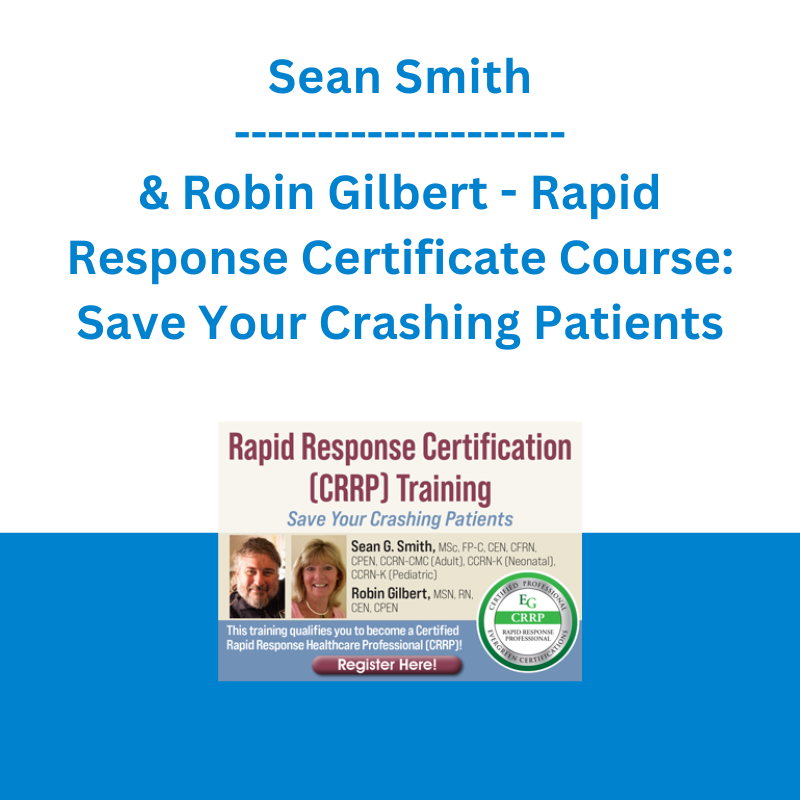*** Proof of Product ***
Exploring the Essential Features of “Sean Smith & Robin Gilbert – Rapid Response Certificate Course: Save Your Crashing Patients”
It’s happened to every nurse in every hospital, nursing home, or clinical setting imaginable: a patient crashes and suddenly you’re in the middle of an emergency.
Even if you call an ambulance or have a rapid response team coming, you may still be taking care of that patient for up to 8 minutes or more.
With lives on the line — and when every second counts — are you confident you could help your patient through a crisis?
Prepare yourself for the unknown and the next patient emergency by becoming a Certified Rapid Response Healthcare Professional (CRRP)!
This comprehensive certification training — designed to be completed on your own schedule — will:
- Dramatically increase your confidence with advanced assessment and proactive rapid response skills
- Teach you how to spot the early signs of a clinically deteriorating patient
- Help you master medication updates
- Provide hours of the BEST resuscitation and stabilization strategies
- Legal advice to protect your patients AND yourself
- And SO much more!
Gain new clinical insights and critical thinking skills and don’t spend another shift feeling uncertain, scared, or at risk!
What Will I Learn in this Course?
This intensive certification course gives you the next-level skills necessary to proactively assess and intervene in the crashing critically ill patient!
Emergency-medicine expert Sean G. Smith will walk you through important topics, like:
Proactive Planning: Begin with the End in Mind
- Pre-Planning for the worst at every patient encounter
- Mental strategies for success
- Failure to rescue and how to avoid it
- Proactive risk assessment of practice environment/patient populations
- Clear coherent communication of high-risk information
- Concise comprehensive management of the crashing patient: Before, during and after the code
Advanced Assessment: Next Level Connection of Form and Function
- Review of Major Systems (Neurologic, Cardiovascular, Pulmonary, Multisystem)
- Integrated advanced laboratory medicine/Clinical implications
- Differential diagnosis/Consults/Follow-up studies
Pathology: Priority Problems, Rapid Recognition and Rescue
- For each of the 25+ pathologies below, the following will be discussed:
- Presentation: Rapid review of form and function
- Pathophysiology: Complications/Comorbidities
- Projected clinical course: Where are we going with this?
- Palliation and pharmacology: Cutting-edge practice guidelines
- Neurology
- Neuromuscular Disorders, Meningitis, Toxicology (Overdose), Traumatic Brain Injury/Concussion, Stroke/TIA, Dementia/Delirium, Agitated/Combative Patients
- Cardiovascular
- Dysrhythmias, Acute Coronary Syndrome, CHF, Heart Failure, Cardiomyopathies
- Endocarditis, Pericarditis, Peripheral Vascular Disease
- Pulmonary
- Asthma/Upper Respiratory, Anaphylaxis, Aspiration/Dysphagia, COPD, Pneumonia
- Metabolic/Endocrine Complex Comorbidities and Emergencies
- Chronic/Acute Kidney Disease, Renal Calculi, Hypertension, Diabetes
- Gastrointestinal/Genitourinary
- Cholecystitis, Pancreatitis, Cirrhosis, Hepatitis, Infection (UTI, STI, etc.)
- Psychosocial
- Screening for: Abuse, Neglect, Depression/Suicidal Ideation
- Shock States, Sepsis, and Trauma
- Hypovolemic, Distributive, Obstructive
- Multisystem Management of the Poly-trauma Patient
Legal Lessons: Protect Your Practice… Tips, Tricks, Pearls, and Pitfalls
- Professional issues/Potential pitfalls (Delegation, Scope, EMTALA, etc)
- Rapid risk assessment and analysis
- Limit liability
- Defensible documentation
Putting It All Together: Case-Based Review
- Identify Key Missed Moments, Lessons Learned and Best Practices
- Assessment
- Intervention
- Documentation
Your Registration Includes Instant, Unlimited Access to a BONUS CE Training
Managing Patient Emergencies: Critical Care Skills Every Nurse Must Know
Robin Gilbert, MSN, RN, CEN, CPEN
You have a patient admitted with pneumonia and right-sided heart failure. Twenty minutes after admission, she develops worsening dyspnea and hypotension.
- Are you prepared to manage her unstable condition?
- Do you know what respiratory measures are necessary?
- Do you know the best way to manage her hypotension?
It is important to be able to rapidly assess and implement appropriate interventions.
Watch this bonus video to sharpen your skills and be prepared to identify and manage your next patient emergency.
Meet the Course Experts
- Sean G. Smith, MSc, FP-C, CEN, CFRN, CPEN, CCRN-CMC (Adult), CCRN-K (Neonatal), CCRN-K (Pediatric), is a flight nurse-paramedic who has practiced and taught Trauma Care, Tactical Medicine, Emergency/Critical Care, and Prehospital Emergency Medical Services, both in the military and the civilian world. He holds degrees in nursing and molecular biology, and is a graduate of Duke University’s Legal Nurse Consulting program. He holds multiple advanced specialty certifications as well as extensive instructor qualifications in critical care and emergency medicine.
- Robin Gilbert, MSN, RN, CEN, CPEN, has over 25 years of experience in emergency nursing. She is both a certified emergency nurse and certified pediatric emergency nurse. Robin has extensive experience working in the emergency department, progressive care, intermediate care, transitional care, step-down, and currently as the regional manager for staff development at Central Maine Medical Center. Robin draws on her expertise to teach her own hospital staff and experienced healthcare audiences throughout the country on a variety of critical care and emergency nursing topics.
Please see the full list of alternative group-buy courses available here: https://lunacourse.com/shop/









